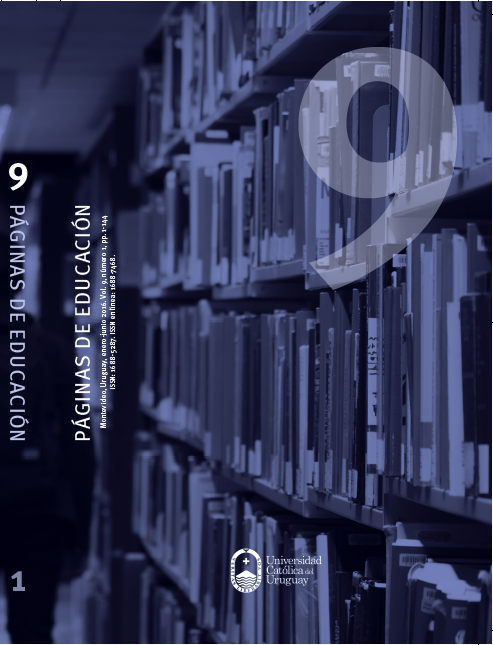Survival analysis applied to the time frame required for higher education degree attainment: the case of the University of Costa Rica
DOI:
https://doi.org/10.22235/pe.v9i1.1179Keywords:
Degree Attainment, survival analysis, Kaplan-Meier, Cox regression, financial aid.Abstract
The paper analyzes the time frame required for bachelor degree attainment, as well as its relation with socio-demographic variables and academic aptitude. A follow-up study of students entering the University of Costa Rica between 2000 and 2003 was conducted up until 2010. The data were analyzed using Kaplan-Meier survival curves. A higher probability of early graduation was found in women and students enrolled in branch campuses. Moreover, Cox regression models were estimated, showing a negative correlation between the time frame required for obtaining the bachelor degree, on one hand, and the score obtained in an academic aptitude test, the type of high school (public/private), and whether the student had received financial aid from the university, on the other. The results show a trend in students with higher academic aptitude of successfully finishing their studies earlier. Furthermore, socioeconomic condition does not have a significant effect. The authors claim that this pattern is due to the role of the financial aid system of the university.Downloads
References
Astin, A.W., & Oseguera, L. (2005). Degree Attainment Rates at American Colleges and Universities. Los Angeles, CA: Higher Education Research Institute at UCLA.
Astin, A.W., & Oseguera, L. (2012). Pre-College and Institutional Influences on Degree Attainment. Seidman, A. (Ed.), College Student Retention: Formula for Student Success (245-277). Washington, DC: American Council on Education/Praeger Series on Higher Education.
Bergeron, D. y Flores, A. (2015). Improving College Access and Degree Attainment Through an Early Guarantee of Federal Financial Aid. Washington, D.C: Center for American Progress.
Carrell, S. E., & Sacerdote, B. (2013). Why do college-going interventions work? Cambridge, MA: National Bureau of Economic Research.
Carruthers, C.K. & Özek, U. (2016). Losing HOPE: Financial aid and the line between college and work. Economics of education review, 53, 1-15.
CONARE (1993). Perfil de los graduados de Educación Superior Universitaria Estatal. San José, Costa Rica: OPES.
CONARE (2001). La situación laboral y otras características de los graduados de 1998 de las Universidades Estatales. San José, Costa Rica: OPES.
Cox, D.R. (1972). Regression Models and Life-Tables. Journal of the Royal Statistical Society, 34, 187-220.
Cubero, V. M. & Longhi, E. (1995). Validez Predictiva de los Puntajes de Admisión y Confiabilidad de la Prueba de Aptitud Académica. Actualidades en Psicología, 11, 88-89.
Engle, J. y O’Brien, C. (2007). Demography is not destiny: Increasing the graduation rates of low-income college students’ at large public universities. Washington: The Pell Institute.
Fernández, A. y Del Valle, R. (2013). Desigualdad educativa en Costa Rica: La brecha entre estudiantes de colegios públicos y privados. Análisis con los resultados de la evaluación internacional PISA. Revista CEPAL, 111, 37-57.
Gómez, G (2004) Análisis de supervivencia. Barcelona, España.
Hosmer, D.W., Lemeshow, S. y Sturdivant, R.X. (2013). Applied logistic regression. Hoboken, NJ: John Wiley.
Jiménez-Alfaro, K. y Morales-Fernández, E (2010). Validez predictiva del Promedio de Admisión de la Universidad de Costa Rica y sus componentes. Actualidades en Psicología, 23, 21-55.
Kaplan, E. L. & Meier, P (1958). Nonparametric Estimation from Incomplete Observations. Journal of the American Statistical Association, 53, 457-481.
Montero, E y Villalobos, J. (2004). Estudio Comparativo del Promedio de Admisión a la Universidad de Costa Rica y sus Componentes: Aplicación del Año 2001. San José, Costa Rica: Programa Permanente de la Prueba de Aptitud Académica, Instituto de Investigaciones Psicológicas, Universidad de Costa Rica.
Montero, E., Rojas-Rojas, E., Negrín-Hernández, M., y Francis-Salazar, S. (2015). Efecto de una capacitación sobre los puntajes de la prueba de admisión de la Universidad de Costa Rica: una aproximación bayesiana. Actualidades en Psicología, 119, 115-139.
Programa Estado de la Nación (2015). Vigésimo primer Informe Estado de la Nación en Desarrollo Humano Sostenible. San José, Costa Rica: PEN.
Reglamento del Proceso de Admisión mediante la Prueba de Aptitud Académica (2003). Gaceta Universitaria Universidad de Costa Rica, San José, Costa Rica, 7 de marzo del 2003.















